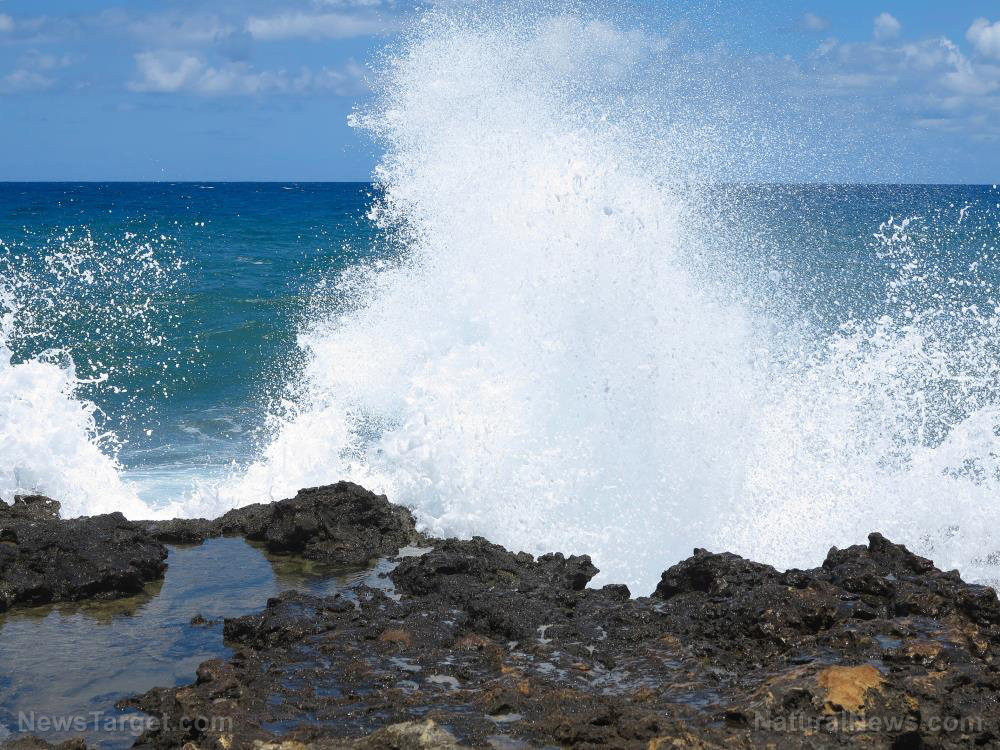Historically, sea levels were much higher with lower CO2 levels, debunking climate hysteria
05/13/2024 / By Lance D Johnson

Climate change alarmists claim that sea levels are rising due to carbon dioxide levels. The climate change cult decry that rising oceans will soon destroy the Earth’s coastal cities if humanity does not collectively reduce CO2 levels from the atmosphere. However, according to earth scientists and paleontological evidence, the opposite reality occurred throughout history’s last major ice age. During that time, there were other factors outside of CO2 that led to warmer summers, ultimately causing shrinkage of the ice shelf and rising shorelines. Evidence along the Moroccan coasts, for example, show that sea levels were once several meters higher than today. Ironically, these higher sea levels were prominent when CO2 levels were much lower (compared to today’s “world-ending” levels).
Evidence from last Ice Age debunks rising CO2 and rising sea level myth
During the Last Ice Age, which lasted from about 129,000 – 116,000 years ago, the summer temperatures in the arctic were much higher than they are today. A new study has found that during this period, the Greenland Ice Sheet melted significantly approximately 121.9 thousand years ago, contributing to a 3-meter rise in sea level globally, when compared to today’s sea level.
According to the study, sea levels were 6 to 9 meters higher during the last interglacial period, when CO2 levels peaked at 275 ppm. Today, CO2 levels are measured at over 400 ppm, yet the sea level today is much lower compared to historical measurements. In fact, there is global evidence that the sea level has actually retreated over time. Today, some coastline regions are simply changing in shape because they are affected by hurricanes, earthquakes and tsunamis. If CO2 was the greatest threat here, then over the last four decades coastlines would have already risen by multiple meters, putting many of our coastal cities underwater. This just isn’t the case.
The results of the study’s simulations indicate that the Greenland Ice Sheet retreated to a minimum extent of 121.9 ka. This is equivalent to an increase of 3 meters in sea level compared to today. The ice sheet then regathered over time.
Most importantly, the regional warming that occurred during the last interglacial period was driven by changes in the Earth’s orbital configuration, which triggered high summer insolation anomalies. These feedbacks across the cryosphere, ocean and atmosphere, were the primary driving force for higher summer temperatures over the northern hemisphere, and these feedbacks allowed these higher surface temperatures to remain steadfast, year after year in the Arctic and over Greenland. This suggests that changes in ocean and climate are largely out of human control, and CO2 levels are not the boogeyman they are made out to be.
Paleontological evidence shows higher sea levels occurred during lower CO2 periods than today
Additionally, paleontologists found human footprints engraved into rock formations that were once part of a sand beach at the edge of the seashore’s “swash flow.” In order for the footprints to be preserved, there needed to be “salt-crusting” in a location at “the landward limits of the spring high tidal zone” and at the “limits of swash flow.”
This former high tide at this site was approximately 20 to 30 meters above today’s sea level. The footprints can be dated back 90,000 years. Further evidence suggests that about 95,000 years ago, sea levels along the coasts of North Africa (Morocco) were once “20 m above the present level.”
Interestingly, this same Moroccan shoreline has, in recent decades, remained stable, and has even advanced outward to sea, at a rate of +0.89 meters per year. In fact, coastal expansion has been occurring globally over the past few decades. Since the 1980s, shorelines have been advancing seaward at a rate of .26 meters per year. This evidence flies in the face of climate cult hysteria.
Sources include:
AGUPubs.onlinelibrary.wiley.com
Submit a correction >>
Tagged Under:
Climate, climate cult, climate hysteria, climate science, CO2 levels, Earth cycles, earth science, Ecology, environment, evidence, ice age, orbital influence, paleontology, real history, research, sea level, truth, warm summers, weather
This article may contain statements that reflect the opinion of the author
RECENT NEWS & ARTICLES
COPYRIGHT © 2017 PENSIONS NEWS




















